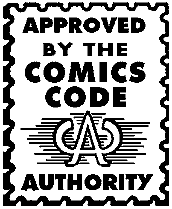
Back Comics Code Authority Catalan Comics Code German Comics Code Authority Spanish مرجع کد کمیک Persian Comics Code Finnish Comics Code Authority French Comics Code Authority Hungarian Comics Code Authority Italian コミックス倫理規定委員会 Japanese Comics Code Dutch
This article needs additional citations for verification. (July 2022) |

The Comics Code Authority (CCA) was formed in 1954 by the Comics Magazine Association of America as an alternative to government regulation. The CCA enabled comic publishers to self-regulate the content of comic books in the United States. The code was voluntary, as there was no law requiring its use, although some advertisers and retailers looked to it for reassurance. Some publishers, including Dell, Western, and Classics Illustrated, never used it. Its code, commonly called "the Comics Code", lasted until the early 21st century. The CC formation followed a moral panic centered around a series of Senate hearings and the publication of psychiatrist Fredric Wertham's book Seduction of the Innocent.
Members submitted comics to the CCA, which screened them for adherence to its code, then authorized the use of their seal on the cover if the book was found to be in compliance. At the height of its influence, it was a de facto censor for the entire U.S. comic book industry, with most comics requiring a seal to be published.[1][2]
By the early 2000s, publishers bypassed the CCA and Marvel Comics abandoned it in 2001. By 2010, only three major publishers still adhered to it: DC Comics, Archie Comics, and Bongo Comics. Bongo broke with the CCA in 2010. DC and Archie followed in January 2011, rendering the code completely defunct.[3][4][5]
- ^ Nyberg, Amy Kite (n.d.). "Comics Code History: The Seal of Approval". Comic Book Legal Defense Fund. Retrieved February 13, 2024.
The Seal of Approval, once prominently displayed on comic book covers, quietly disappeared in 2011. For nearly 60 years, however, censors funded by the comic book industry enforced rules about acceptable content. Only comics that passed a pre-publication review carried the seal.
- ^ Weldon, Glen (January 27, 2011). "Censors and Sensibility: RIP, Comics Code Authority Seal Of Approval, 1954 - 2011". National Public Radio. Retrieved February 13, 2024.
So much for The Comics Magazine Association of America, which for over 50 years served as the comics industry's self-regulating (read: self-censoring) arm.
- ^ MacDonald, Heidi (January 21, 2011). "Archie drops the Comics Code…Wertham dead forever". The Beat. Retrieved February 13, 2024.
- ^ Wolk, Douglas (January 24, 2011). "R.I.P.: The Comics Code Authority". Time. Retrieved February 13, 2024.
- ^ Weldon, Glen (January 27, 2011). "Censors and Sensibility: RIP, Comics Code Authority Seal Of Approval, 1954 - 2011". National Public Radio. Retrieved February 13, 2024.
© MMXXIII Rich X Search. We shall prevail. All rights reserved. Rich X Search